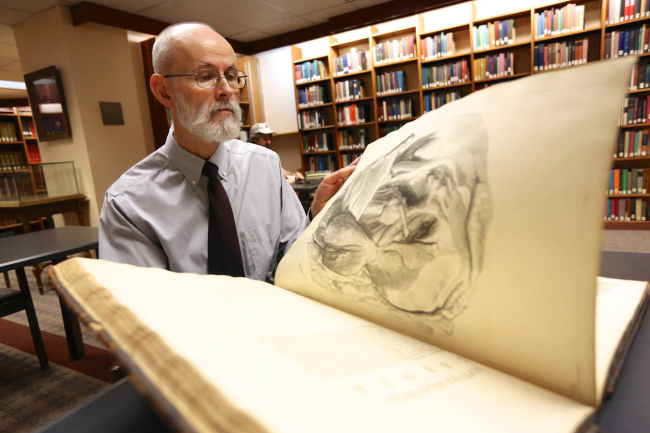
Christopher Hoolihan, librarian emeritus of Rare Books and Manuscripts at Edward G. Miner Library at the University of Rochester Medical Center, spent 42 years working with collections on the history of medicine. He probably had some bad days during that time, but he doesn’t remember them.
“What I remember is the great happiness my work brought me,” Hoolihan says.
Hoolihan’s love for his work seemingly knows no bounds. Case in point, he officially retired from the University of Rochester on a Friday in June 2019, and on following Monday, he was back in Miner Library as a volunteer. His inexhaustible passion is among the distinctive qualities that made him worthy of the 2022 Robert F. Metzdorf Award.
The Metzdorf Award is presented by the Friends of the University of Rochester Libraries (FURL) to those who distinguish themselves with contributions and meritorious service to the libraries.
“I thought the decision to give him the award was so appropriate,” says Barabra Guhde, co-president of FURL, “because this is the kind of person every institution would do anything to have on their team.”
Hoolihan joined Miner Library’s team in 1985. When he started, Miner Library had a quality, modestly-sized rare book and manuscript collection of 6,500 titles. Over the next 34 years, he transformed the collection into one of the country’s top three History of Medicine collections, touting nearly 25,000 titles and more than 55,000 volumes. In addition to outstanding examples of early anatomical books and atlases, the collection is robust in obstetrics and gynecology between the 17th and 19th centuries; it’s a repository for one of the nation's finest collections on yellow fever; it is also home to the Atwater Collection of American Popular Medicine, one of the finest of its kind in any North American library.
In the fall of 2019, Hoolihan published the fourth volume of An Annotated Catalogue of the Edward C. Atwater Collection of American Popular Medicine and Health Reform. “The importance of this work to popular medicine collectors and dealers cannot be overstated,” says Jennifer Raynor, associate dean of Miner Libraries. “When an obscure popular medicine item comes to market, one knows it’s significant if it’s ‘not in Hoolihan.’”
During his tenure, Hoolihan worked diligently to make Miner’s collection accessible and known to the world, cataloging more than 26,000 titles. He was also dedicated to patrons, responding to more than 34,500 requests for materials in the rare book and archival collections. And he published extensively and, for years, served as an integral guest lecturer on the history of medicine in courses on medical humanities, history, and medical illustration.
In his decades of service, Hoolihan distinguished himself as a bibliographer, archivist, medical historian, art historian, and print historian.
“Chris’s contributions couldn’t be more deserving of this award,” Raynor says. “His mark on the History of Medicine community will endure long beyond his tenure, and his name will be associated with History of Medicine librarianship for many years to come.”
A labor of love
As a newly minted librarian at the Washington University School of Medicine in St. Louis (1977), Hoolihan recalls spending his first two months convinced he would be let go.
“I continually expected the director to call me into her office one day and say, ‘Mr. Hoolihan, we’re going to have to let you go. Quite simply, you’re having too much fun,’ Hoolihan says. “And I was. I loved every minute of what I was learning.”
So, what about his work did he love so much that he did it for more than four decades? Here are five reasons from Hoolihan, in brief.
- The materials. “I had the opportunity to work with materials—whether books, or prints, or ephemera, or manuscripts—that were historically important, and actually much more than that. Always scarce and often unique, these materials were the primary sources for understanding of the history of medicine and the history of the institution where I was working.”
- The education. “To be successful in a medical historical collection, a broad base of knowledge is needed. One needs to have a rather detailed understanding of ‘the book technologies,’ including paper-making, the manufacturing of moveable types, printing technologies (from the hand- and machine-press eras), and the graphic technologies used to illustrate these books.”
- The variety. “No two days were ever quite the same. A morning spent cataloging an 18th-century obstetrical atlas might be followed by an afternoon processing a manuscript collection, or work with a visiting scholar, or a negotiation with an antiquarian bookseller about a new acquisition, or speaking to a group of medical students.”
- The patrons. “One of the most satisfying aspects of my career was being able to work with a diverse group of individuals—e.g., historians, novelists, lawyers, medical students, artists, physicians, genealogists, etc.—needing access to our collections. Nothing was more satisfying than to be able to match a client with a book, manuscript, photograph collection, or broadside, and then see their response to the remarkable materials they too felt privileged to handle.”
- The support. “I could not have asked for better support from directors who not only appreciated the inherent value of our historical collections, but the role that special collections and medical history plays in medical education. I’ll mention just two. I worked for Jennifer Raynor only a year before my retirement, but was always certain of Jennifer’s understanding of what Rare Books & Manuscripts is about. I’d also like to make mention of Julia Sollenberger, an extraordinary library administrator and a great advocate for the importance of our historical collections when dealing with the Medical Center administration.” ∎
For more information on the Metzdorf Award or FURL, please contact Kim Osur, development manager for the River Campus Libraries, at kim.osur@rochester.edu. Interested in learning more about the Miner Libraries? Contact Jennifer Raynor at Jennifer_Raynor@URMC.Rochester.edu.
Enjoy reading about the University of Rochester Libraries? Subscribe to Tower Talk.


